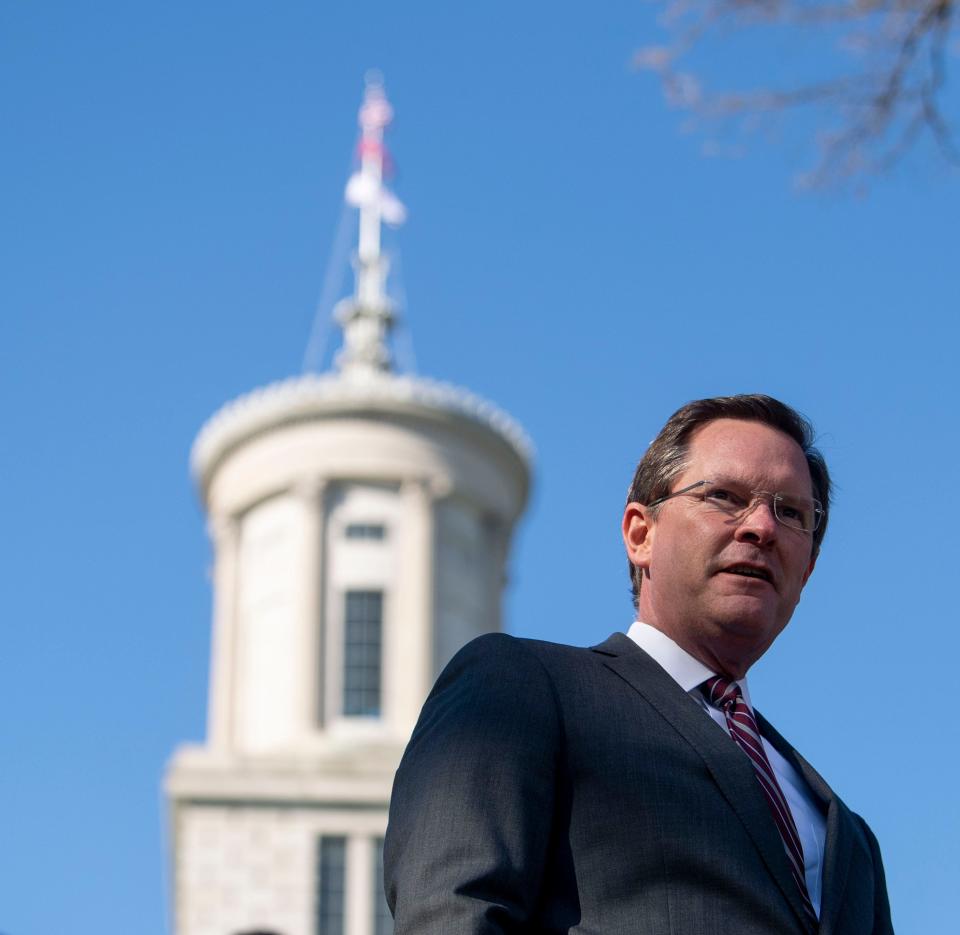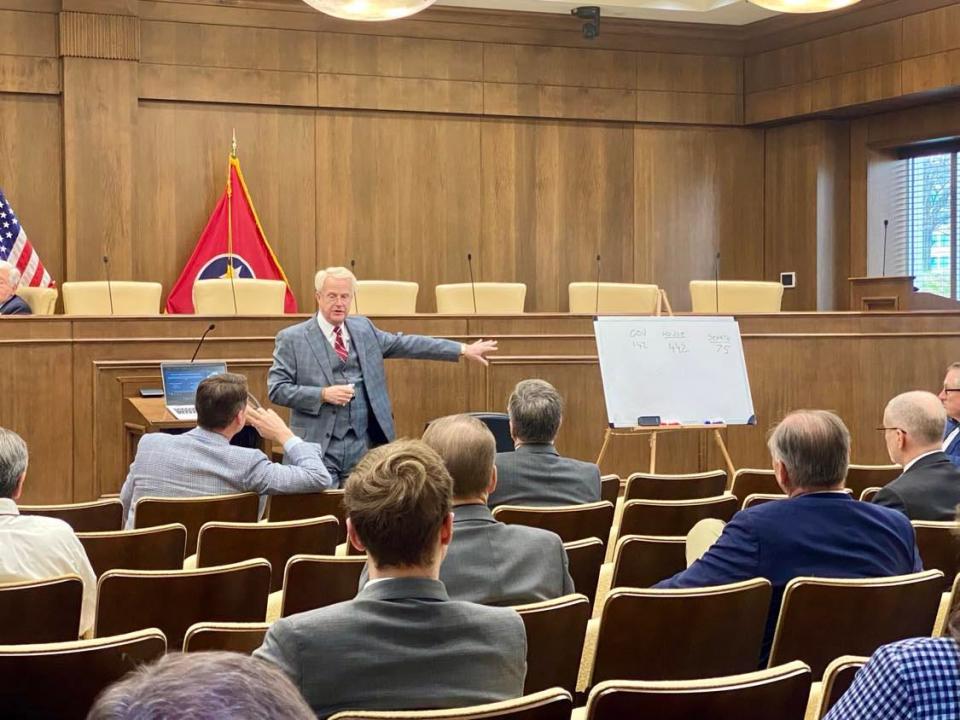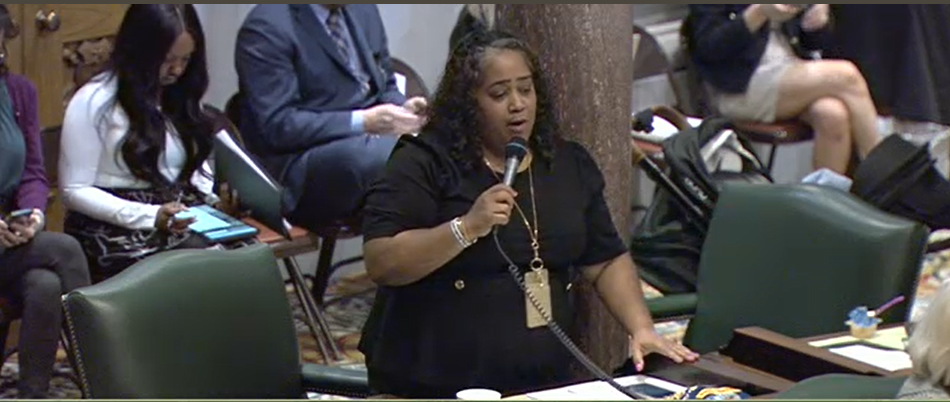How Tennessee House Republicans plan to fund their version of the voucher bill | The week in politics
As lawmakers continue to hash out parameters for a proposed statewide school choice program, House leadership is proposing to pay for some of their proposal with a pot of money that funds teacher raises.
House leadership said Thursday their plan will fund teacher insurance at a higher level, leaving more "take-home" pay for teachers.
"The No. 1 issue they have in a lot of areas is the amount they have to pay for insurance," House Speaker Cameron Sexton, R-Crossville, said of teacher feedback education committee members have received. "We propose to pay 60%, and increase what the state pays with a goal of trying to get to 80%. That would increase the take-home pay of what teachers take, in a lot of instances, and it frees up a lot of money locally that they can put back into teacher increases, if they so choose."
Gov. Bill Lee originally proposed $144 million for his Education Freedom Scholarships program. The governor's budget also includes a $261.3 million funding increase for public schools under the state's new Tennessee Investment in Student Achievement K-12 funding model. The increase proposed by Lee includes funding to bring starting pay for teachers to a minimum of $50,000 per year by 2027 ― something Lee has repeatedly committed to do.
Currently, the Senate version of the voucher bill is estimated to cost the state about $75 million ― with savings realized by funding the scholarships through allocations made in the state's new K-12 TISA funding structure.

But the House version of the voucher bill includes about $250 million for public schools beyond the $144 million originally proposed. The funding would go to increase the state-paid portion of public school teacher health insurance benefits from the current 45% to 60%, and offer school districts a per-student allocation for school infrastructure and maintenance, among other things.
House leadership confirmed they intend to pay for the difference with the $261.3 million in the governor's budget that right now is allocated toward TISA increases for public schools ― and also includes teacher salary raises ― "through a reallocation of the funding proposed by the Governor," Sexton spokesperson Connor Grady told The Tennessean in a text message.
"If you raise the amount we're paying toward their health insurance, that actually is money that can go directly in teacher's pockets," House Majority Leader William Lamberth, R-Portland, told reporters on Thursday. "That's what we want to do, as the speaker said, and be more strategic about how that $261 million is allocated."
Senate leadership has said they prefer their version of the bill, which Senate Education Committee Chair Jon Lundberg, R-Bristol, touted during a caucus meeting as both more streamlined and more fiscally conservative than the House version.

"We had a conversation with our House counterparts a week ago, and it took them about 2 minutes to explain their Education Freedom proposal ― and it took them about 17 minutes to explain the rest of what they had contained in their bill," Lundberg said. "We are still in talks about how we can come together."
Gardenhire attempts to add appointed attorney funding
Sen. Todd Gardenhire, R-Chattanooga, is sponsoring a budget amendment to fund a $26 million request from Administrative Office of the Courts to raise the appointed attorney rate for the first time in decades.
Tennessee’s indigent defense reimbursement rate is the lowest in the nation and has only been raised $20 in the last four decades. The state is constitutionally required to provide legal counsel for those who can't afford it, and courts often must recruit independent attorneys for appointments outside of the public defender system. Though a task force studying the issue several years ago recommended raising it from $50 per hour to $120, the AOC made a "conservative" ask to fund an $80 hourly rate this year.
It's not the first time the courts have requested the money, but the funding was once again left out of Lee's budget.
Gardenhire decided to sponsor the amendment following committee testimony from Williamson County attorney David Grimmett and the Tennessee Bar Association.
The Tennessean last year reported the state's rate has squeezed Tennessee's judicial system to a “breaking point,” as judges struggle to find attorneys to appoint to case that lawyers are hesitant to take on.
Nearly half of all indigent cases involve families and child welfare issues in juvenile court, and Davidson County Juvenile Court Judge Sheila Calloway told The Tennessean the juvenile courts struggle to adhere to federally mandated case schedules as court staff scramble to convince attorneys to take on cases.
"On behalf of the juvenile court bar and every appointed counsel in this state, I am begging you to raise the rate for appointed counsel so that we can find a voice for these children and these families," Grimmett said.
‘Christian Heritage Month’ designation goes to governor
A bill to designate November as “Christian Heritage Month” is on its way to Lee's desk after receiving final approval from the Tennessee Senate on Thursday morning.
If signed by the governor, Christian heritage could be observed in Tennessee alongside 14 other state-designated months of observation including “Barber, Beauty, and Health Month” (April), “Silver Alert Awareness Month” (May), “Tennessee Archaeology Awareness Month” (September), and “Brain Aneurysm Month” (September).
Republican senators passed the bill Thursday in 26-2 vote with 3 Democrats abstaining. Sens. Jeff Yarbro, D-Nashville, and Heidi Campbell, D-Nashville, opposed the bill.
Proposed by Sen. Paul Rose, R-Memphis, and Rep. Rusty Grills, R-Newbern, the bill, House Bill 2125, would designate the month of November as a time “to encourage citizens to learn more about Christian heritage in this state.”
“We cannot dictate, we cannot mandate – but we should recognize where we came from,” Rose said before the vote Thursday, noting that 37 of the 56 signers of the U.S. Constitution had “the equivalency of a seminary degree.”
Senate Minority Leader Raumesh Akbari, D-Memphis, cited First Amendment concerns, saying the designation to “mix government and religion” is “dangerous,” and could be “a slippery slope.”

“There’s a reason why when we have people pray for us at the beginning of session, we bring in people of a range of faiths because that represents us as the state of Tennessee,” Akbari said.
But Sen. Page Walley, R-Savannah, said that designating a month to acknowledge a certain heritage is “already common practice.” He listed several designated heritage and awareness months on the Harvard University calendar, including Black History Month (February), Women’s History Month (March), LGBTQ Pride Month (June), and Native American Heritage Month (November).
Sen. Kerry Roberts, R-Springfield, said that he feels it’s almost become “taboo” or “offensive” to bring up aspects of Christian heritage of the U.S., including the faith of the founding fathers.
“The point of this is that there’s a rich history here that gets lost,” Roberts said.
Sen. Ferrell Haile, R-Gallatin, argued that the bill is “a historical notation, not establishing a religion,” saying that he would oppose any effort to do so – and calling the Roman emperor Constantine’s declaration of Christianity as the religion of Rome “the worst thing in the history of Christianity.” Constantine’s Edict of Milan prohibited brutal persecution of Christians across the Roman Empire, and he later called the eccumenical Council of Nicaea, from which was issued the Nicean Creed – a statement of faith still professed today by hundreds of thousands of churches across the globe.
Blackburn touts border security bills on trip to Eagle Pass
U.S. Sen. Marsha Blackburn, R-Tennessee, visited Eagle Pass, Texas to tour the U.S. border with Mexico, and observe local border security efforts undertaken in Operation Lone Star.
“Just over a year ago, I was here in Eagle Pass and it was the hot spot, and they had people by the thousands coming over,” Blackburn told reporters after her visit. “Texas with Operation Lone Star stepped up and said, ‘we are going to secure our southern border.’ And with some buoys in the river, with containers on the riverbank, with razor wire and fencing, they have done that and their numbers have dramatically decreased.”

Blackburn claimed that while overall illegal entries to the United States are up, individuals seeking to cross the border unlawfully are doing so more in Arizona and California – and less so in Texas.
While there, Blackburn touted two bills she’s sponsoring to bolster border law enforcement: the CONTAINER Act, which would allow state and local governments to construct temporary barriers on federal lands along the border, and the CLEAR Act, which would allow law enforcement to apprehend and detain individuals in the United States unlawfully who also commit another crime.
I’ll take Davy Crockett for $1 million
Lee’s budget amendment, released this week, includes $1 million for a statue of Tennessee pioneer and frontiersman David Crockett on state Capitol grounds.
Lawmakers in 2012 established the David Crockett Commission to begin work toward erecting a monument as a “permanent tribute to one of Tennessee’s most prominent citizens throughout its history.” At the time, Rep. David Hawk, R-Greeneville, who has led the charge for creation of a Crockett statue, noted that state funds would not be used for the project.
In 2018, the legislature authorized the commission to raise private funds toward the monument, noting the legislature’s intent that “any available private funding is used to the full extent possible and that no state funds shall be used for such project until all private funding is exhausted.”
But despite the nine-member commission's 12 years of existence, no private funds have yet been raised.
"If approved by the General Assembly, Gov. Lee’s proposed budget item will be the first investment in the David Crockett Commission Fund," Finance and Administration spokesperson Gina Long told The Tennessean in an email. "This will appropriate the necessary funds to begin design, planning and installation of a statue honoring one of Tennessee’s most storied heroes."
Reversing the legislative intent of 2018, Hawk now says state funding will help jumpstart private fundraising to support the initiative.
"While we previously didn’t have the funding to pay for the construction of a statue in his honor, we are now in a strong financial position to follow through with this important project," Hawk told The Tennessean in a statement. "These funds will serve as seed money to kickstart an influx of private donations to help tell Crockett’s story. I am committed to preserving and protecting the history of Tennessee and I support Gov. Lee’s proposed allocation for this landmark.”
There’s already one likeness of the legendary Tennessean inside the Capitol: a bust of Crockett keeps an eye on the House Chamber doors from an alcove on the second floor. Lawmakers voted in 2014 to place a bust of Crockett there, across from a bust of Andrew Johnson. It was unveiled in 2016.
“David Crockett is an American legend and his contributions to Tennessee have had a lasting impact on this state," Hawk said. "His accomplishments and the story of his life in the Volunteer State deserve significantly more recognition."
Election Finance Registry ends Humble campaign probe
The Tennessee Registry of Election Finance has ended an 18-month inquiry into Tennessee Stands founder Gary Humble’s 2022 Senate campaign.
Launched shortly after the 2022 primary election, Registry members voted to review Humble’s campaign finance records to determine whether his campaign unlawfully coordinated with Tennessee Stands during the election. The inquiry is now closed.
“After 18 months, I’m glad that it is over. They say that the process is the punishment. And it is hard not to feel as if this was some type of political retribution for challenging a 16-year incumbent Majority Leader,” Humble said in a statement this week. “The work of the Registry is important and the people of Tennessee certainly deserve transparency. But candidates should also have the ability to run for public office without fear of reprisal or retribution by the political establishment.”
Officials remember the late U.S. Sen. Joe Lieberman
Tennessee officials honored U.S. Sen. Joe Lieberman, D-Connecticut, who died at age 82 this week after complications from a fall.
Lieberman served as former Vice President Al Gore's running mate in the 2000 presidential election. Gore called him "a man of deep integrity who dedicated his life to serving his country."
"He was a truly gifted leader, whose affable personality and strong will made him a force to be reckoned with," Gore said in a social media tribute. "That’s why it came as no surprise to any of us who knew him when he’d start singing his favorite song: Frank Sinatra’s “My Way.” And doing things Joe’s way meant always putting his country and the values of equality and fairness first."
"It was an honor to stand side-by-side with him on the campaign trail," Gore added. "I’ll remain forever grateful for his tireless efforts to build a better future for America."
Former U.S. Sen. Lamar Alexander, R-Tennessee, who served with Lieberman in the Senate, said praised his former colleagues willingness to work across the political aisle.
“In his public life, Joe Lieberman lived Sen. Howard Baker’s admonition, “The other fella might be right.” That did not endear him to partisans but it made him a rare and valuable United States Senator,” Alexander said in a statement. “He stuck to his principles but he was open to other points of view—sponsoring bipartisan senate breakfasts and crossing the aisle to work on legislation. There will never be enough men and women in public life like Joe Lieberman. I will miss his friendship and the nation will miss his example.”
Catch up on the week
Republican lawmakers vacate full Tennessee State University board over Democratic objections
Tennessee bill allowing concealed carry in all businesses fails in Senate committee
In break from Tennessee Senate, House franchise tax bill would require public disclosure
Tennessee law named after slain Belmont student Jillian Ludwig advances in House
Inside the web of special interest groups pushing for expanded Tennessee school vouchers
Lee's updated TN budget includes more money for tax change but not House voucher bill
Tennessee bill to designate the Aitken Bible, others 'state books' heads to governor
Got a question for us?
Got a question about state politics you would like us to tackle? Let us know. Email us at [email protected], [email protected] or [email protected].
This article originally appeared on Nashville Tennessean: Tennessee school vouchers: House GOP unveil plan to fund their version
